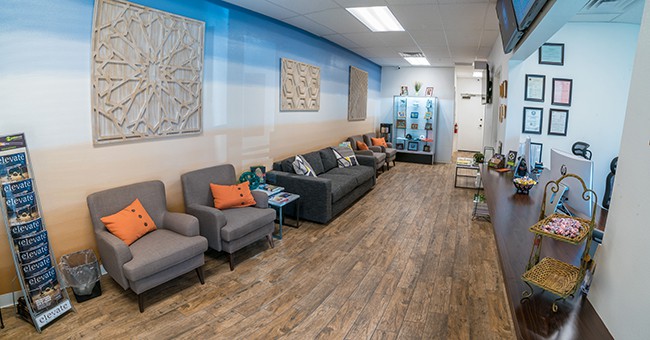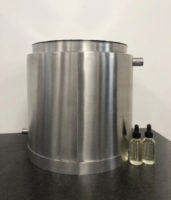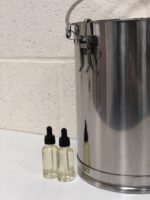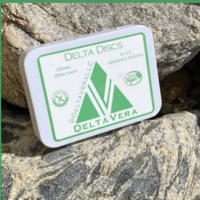The average dispensary in Las Vegas pulls in about $2 million in revenue per month, while larger stores have reported up to $10 million in single-month sales. Even in 2020, amidst the COVID-19 pandemic, legal cannabis statewide in Nevada clocked $789 million in sales. And prospective business owners want in: State-issued licenses have traded hands for as much as $20 million each.
Owning a cannabis company in the Silver State can be an incredibly lucrative endeavor. But for all of the Green Rush’s successes—80 operating dispensaries, 158 grow houses and 110 production facilities—still only one company has a Black woman running the show from the top.
On the remote east side of Sin City, just before houses and roads give way to miles of desert sand, a mom-and-pop-style cannabis store serves thousands of mostly local residents. Top Notch The Health Center, styled as Top Notch THC next to a bright green medical cross on its cream-colored building, welcomes a broad customer base.
Kema Ogden is one of three Top Notch owners and still the only Black woman able to make such a claim in Nevada. Unlike most of her counterparts in the industry, who have sold off their marijuana empires for up to $300 million, Ogden has held onto her dispensary. She’s also still regularly involved in the day-to-day operations.
“We’ve always been focused on being a grassroots company and being a part of the local community,” she said. “The community supports us back, and those relationships that we’ve built over the years really help keep us grounded.”
A former fitness trainer and philanthropist, Ogden would have called you crazy a decade ago if you told her that part of her future would be dealing legal weed. The wife of NFL Hall-of-Famer Jonathan Ogden and mother of two has always had a heart for wellness and helping others. But her humanitarian endeavors had always taken more traditional structures, like a family foundation that runs sports and fitness programs as well as a nonprofit hospital that serves uninsured and low-income families.
With marijuana, she gets the best of both worlds: promoting wellness and making a pretty penny doing it.
“Of course, this is a business for us and we’re always considering opportunities to expand and reach more people,” she said. “But cannabis has become a healthy part of a holistic wellness approach for a lot of our customers.”
Small and Friendly, but Not a Boutique
Top Notch is easily one of the state’s smallest dispensaries, with only 1,500 square feet of retail space. Yet the store is anything but a boutique. It carries over 1,600 cannabis products, including hard-to-find medical specialties like Rick Simpson Oil and patient-grade edibles featuring up to eight times more THC than the state’s limit for recreational products.
Its massive selection ranks Top Notch near the top of all dispensaries in the sheer number of items consumers can choose from. Ogden attributed her store’s large supply to remembering why she and partners got into the business in the first place.
“We try to stay patient-orientated because that’s ultimately why we’re here,” she said. “There’s enough money to be made on retail customers where you can still serve the people out there that really need cannabis to make their lives better.”
Unlike just about every other cannabis store in town, Ogden makes her budtenders available for one-on-one consultations from the time a customer steps into the waiting area to when they walk out the exit. Picture a doctor’s office: the nurse opens the door to the waiting room and calls your name, then walks alongside you before sitting down to discuss your needs. Top Notch doesn’t have licensed medical professionals, but the patient process is otherwise identical.
A Family Atmosphere
For many of the 65 employees at Top Notch, working at the dispensary has been a calling fulfilled. Interviewed employees said their jobs are altruistic in the sense that they can advise shoppers seeking physical and mental support on the plant’s benefits for their ailments.
While most cannabis stores across the Vegas Valley have seen their fair share of turnover and turmoil amidst lucrative ownership changes and restructuring, five of Top Notch’s original six employees continue to work at the dispensary to this day.
Lashawn Griego moved down to Vegas from Denver when the store first opened in late 2015. A former kindergarten teacher and occupational health professional, Griego credits Ogden for creating a family-like atmosphere for employees to thrive.
Griego, who like Ogden is a Black woman, started as a greeter at Top Notch’s front door. In six years, she’s worked her way up to being the store’s general manager and now oversees all of the store’s other employees.

Courtesy of Top Notch THC
“I’ve never really stopped to think about my own accomplishments because this is a company I worked hard to grow in,” Griego said. “We’re all laid back and I don’t look at myself as being a caliber above anyone else here. If we’re slammed, I’ll jump in as a budtender. I’ll get behind the desk and I’ll answer the phones. I’ll be security if they need me to.”
Griego, 49, credits Ogden for helping her ascend to a career she otherwise wouldn’t have realized.
“She just encourages and motivates you and gets you to where you want to be,” Griego said. “She saw value in me before I saw it in myself.”
Blazing a Trail for Others
A January 2021 report from the state’s Cannabis Compliance Board showed Nevada’s marijuana industry is pretty diverse as a whole. Over 38% of people involved in the industry are women, a quarter are Hispanic and nearly 11 percent are Black or African American. The percentage breakdowns for race are relatively consistent with the state’s population of 3.2 million people.
A closer look at the report, though, shows most of the women and minority stakeholders skew toward the bottom levels of the totem pole—think receptionists, budtenders and security. At the top, white men account for nearly three-quarters of company owners.
Previous state initiatives designed to level the ownership playing field have essentially been nothing more than lip service from politicians to underrepresented groups, Ogden said. 2017 regulations incentivizing companies to add women and minorities as owners, executives or board members gave way to a host of new “sham boards” in which minorities received new fancy-sounding titles but had no real impact on the companies they worked for.
Still, Ogden insists there’s hope for the future. Recently appointed by Nevada’s governor to a 12-member Cannabis Advisory Commission, she pointed to a bill at this year’s state legislature that would let cannabis lounges open. The bill would also allow for entertainment operators to apply for permits so patrons could smoke at festivals and music concerts.
The new permits won’t be capped by the state. And less barriers to entry means more minority owners will have a shot at owning a cannabis business.
“Equality is something I’m very passionate about, and the ideas we have out there now are steps in the right direction,” Ogden said. “When we start getting more diversity at the ownership table, I think this industry will flourish in ways we’ve never seen before.”








